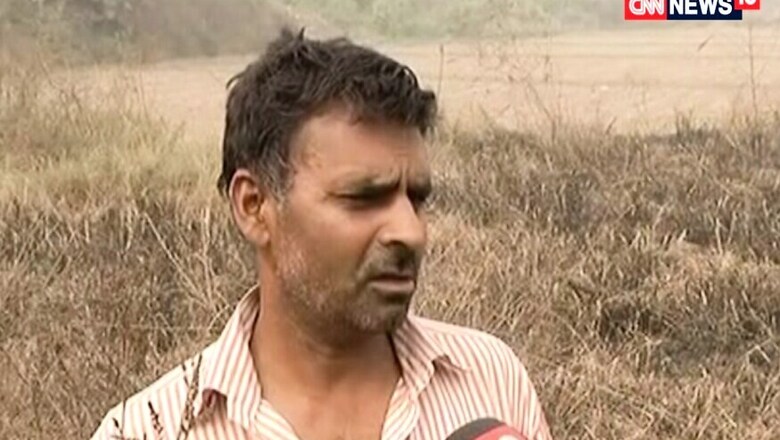
views
Sonepat: As Delhi NCR and parts of Haryana, Punjab, northern India reel under massive air pollution, stubble burning in these areas continues unabated.
In a ground-check in and around Sonepat, it was found that farmers are still burning stubble in farms. Even though, the air quality in Delhi on Thursday noon recorded an AQI (Air Quality Index) reading of 491 — the high end of the “severe" category.
Combustion particles from biomass burning, solid waste burning, vehicle emissions, chulhas, pet coke, etc, form a large chunk of PM2.5. PM2.5 simply means particulate matter 2.5 micrometers or less in diameter. These micro particles have been swimming in our air, entering our lungs and wreaking havoc in Delhi, especially in winters, the past few years.
NGT in October had warned the governments of Punjab, Haryana, Uttar Pradesh and Rajasthan that it would stop the payment of salaries of government officials if they failed to come up with an action plan to prevent stubble burning, which triggers heavy pollution in Delhi-NCR.
Farmers usually resort to stubble burning to save money. Sanjeev, a Sonepat-based farmer, told CNN-News18: "We have no option but to burn. There is so much stubble that we cannot dispose it any other way. It costs a lot. We are poor and helpless what should we do?"
Arvind Kejriwal urged Centre, Haryana, Punjab and Delhi governments to come together to find a permanent solution to stubble burning which leads to high pollution every year. The chief minister said that penalising farmers will not solve the problem.
Another farmer said that the burning was actually being done in nearby Punjab and sought help from the government in helping them dispose of the stubble from farms.
"The government must help us. We are not burning stubble here. It is only in Punjab and Amritsar. No one wants to burn stubble," the farmer said.
Kejriwal has, meanwhile sought time with his counterparts in Punjab and Haryana to find a workable solution. Haryana CM ML Khattar said that he had received the communique from Kejriwal and his government was already working to address the issue.
The Delhi HC directed that an emergency meeting must be held between Union Environment, chief secretaries of all NCR states and pollution control bodies within three days.
Among other solutions, it also said that cloud seeding could also be considered to mitigate the pollution. It also directed regular cleaning and sprinkling of roads, taking off vehicles which are 15 years old (petrol) and 10 years old (diesel) et al.




















Comments
0 comment